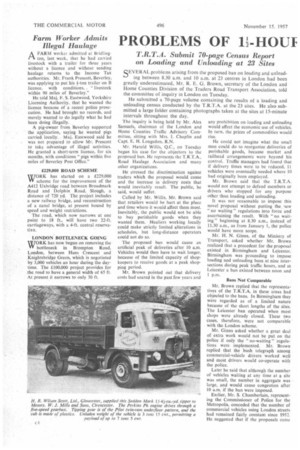PROBLEMS OF &HMI
Page 40

If you've noticed an error in this article please click here to report it so we can fix it.
T.R.T.A. Submit 70-page Census Report on Loading and Unloading at 23 Sites
SEVERAL problems arising from the proposed ban on loading and unloading between 8.30 a.m. and 10 a.m. at 23 centres in London had been greatly underestimated, Mr. R. E. G. Brown, secretary of the London and Home Counties Division of the Traders Road Transport Association, told the committee of inquiry in London on Tuesday.
He submitted a 70-page volume containing the results of a loading and unloading census conducted by the T.R.T.A. at the 23 sites. He also submitted a large folder containing photographs taken at the sites at 15-minute intervals throughout the day.
The inquiry is being held by Mr. Alex Samuels, chairman of the London and Home Counties Traffic Advisory Committee, sitting with Mrs. I. Chaplin and Capt. E. H. Longsdon, R.N.
Mr. Harold Willis, Q.C., on Tuesday began his case for the objectors to the proposed ban. He represents the T.R.T.A., Road Haulage Association and many other organizations.
He stressed the discrimination against traders which the proposal would cause and the increase in delivery costs that would inevitably result. The public, he said, would suffer.
Called by Mr. Willis, Mr. Brown said that retailers would be hurt at the place and time where it would affect them most. Inevitably, the public would not be able to buy perishable goods when they wanted them. Hauliers working locally could make strictly limited alterations in schedules, but long-distance operators could not do so.
The proposed ban would cause an artificial peak of deliveries after 10 a.m. Vehicles would then have to wait longer, because of the limited capacity of shopkeepers to receive goods at a peak shopping period.
Mr. Brown pointed out that delivery costs had soared in the past few years and
any prohibition on-loading and unloading would affect the economic use of vehicles. In turn, the prices of commodities would rise.
He could not imagine what the small man could do to reorganize deliveries of perishable goods, because market and railhead arrangements were beyond his control. Traffic managers had found that if delivery times were to be reduced, 11 vehicles were eventually needed where 10 had originally been employed.
Mr. Brown said that the T.R.T.A. would not attempt to defend members or drivers who stopped for any purpose other than loading and unloading.
It was not reasonable to impose this novel proposal without putting the. new " no waiting" regulations into force and ascertaining the result. With "no waiting" beginning at 8.30 a.m., instead of 11.30 a.m., as from January 1, the police would have more scope.
Mr. H. N. Ginns, of the Ministry of Transport, asked whether Mr. Brown realized that a precedent for the proposal existed in Birmingham and Leicester. Birmingham was proceeding to impose loading and unloading bans at nine intersections during peak traffic hours, and in Leicester a ban existed between noon and I p.m.
Bans Not Comparable
Mr. Brown replied that the representatives of the T.R.T.A. in these areas had objected to the bans. In Birmingham they were regarded as of a limited nature because of the short lengths of the sites. The Leicester ban operated when most shops were already closed. These two cases, therefore, were not comparable with the London scheme.
Mr. Ginns asked whether a great deal of extra work would not be put on the police if only the " no-waiting " regulations were implemented. Mr. Brown replied that the bush telegraph among commercial-vehicle drivers worked well and most drivers would co-operate with the police.
Later he said that although the number of vehicles waiting at any time at a site was small, the number in aggregate was large, and would cause congestion after 10 a.m. if the ban were imposed.
Earlier, Mr. S. Chamberlain, representing the Commissioner of Police for the Metropolis, conceded that the number of commercial vehicles using London streets had remained fairly constant since 1952. He suggested that if the proposals came








































































































